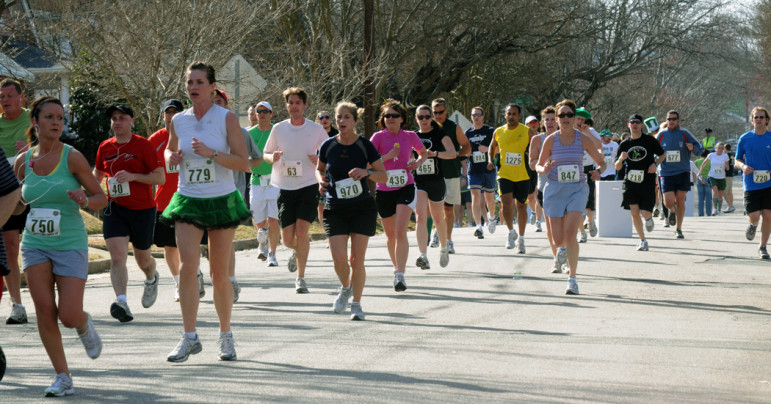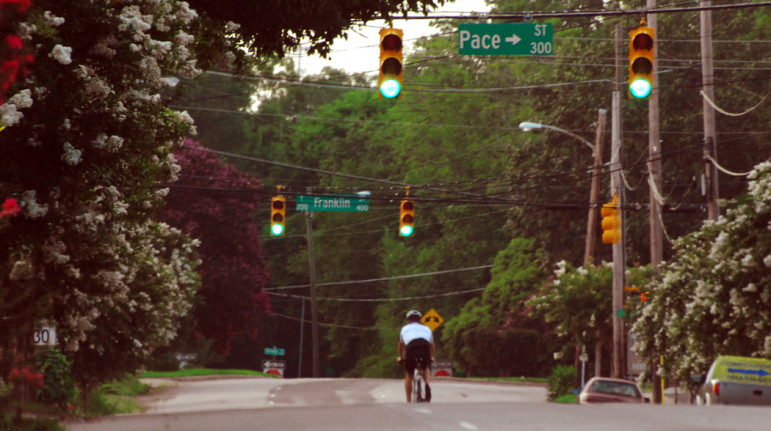Ongoing concerns about events taking over some Raleigh neighborhoods led to a lively debate between City Councilors about the best solution to the problem.
The City Council’s Law and Public Safety Committee recommended lowering the annual race cap from 100 events to 95 events. The recommended plan also bans existing races from closing streets in the same neighborhoods on back-to-back weekends.

Karen Tam
Raleigh\’s Road Races have been the source of much contention lately
Fees for events would be increased as part of the plan, ranging from $200 to $350 per event, while fees for smaller neighborhood events would be reduced to $50.
Emergency and Special Events Manager Derrick Remer said the hope is that these changes will spread out events and reduce the impact of existing races in neighborhoods that have been bombarded thus far.
While the plan does not put specific limits on the number of events that can be held in certain neighborhoods, new races will not be allowed in high-impact neighborhoods around downtown including: Mordecai, Oakwood, Boylan Heights, University Park and Cameron Park.
After 2016, events that are in conflict with the new rules will be forced to move to alternate locations.
Councilors Thomas Crowder and Russ Stephenson expressed concern about whether the recommended plan does enough to ease neighborhood concerns.
“For me it seems like a high burden for these desirable locations to bear,” Stephenson said.
Councilors agreed to hold the issue to gather additional information about the matter.
Raleigh’s Artistic Future
The development of Raleigh’s Arts Plan continues to move forward.
City Councilors approved a steering committee that will assist with the development of the Raleigh Arts Plan.
The 35-person committee represents a broad spectrum of the city including members of city boards and commissions as well as leaders in the arts and business communities. Mayor Nancy McFarlane was appointed by the City Council to serve on the committee.
The Raleigh Arts Plan will provide a roadmap designed to move the city toward becoming the “Southern Capital of Arts and Culture.” Methods to achieve this goal include:
- Identify art forms and activities valued by Raleigh residents, and the role art plays in communities
- Increase participation in the arts as a means of improving quality of life
- Increase funding for the arts
- Nurture artists and arts organizations
- Determine the role of the arts in supporting cultural tourism and promoting Raleigh
- Motivate elected officials, business and community leaders, and residents to invest in and advance the strategies of the Raleigh Arts Plan
A draft of the Raleigh Arts Plan is expected to be presenting in the spring with a final draft expected by next summer.
NeighborWoods for the Neighborhoods
The City of Raleigh’s NeighborWoods Tree Planting Program adds trees to the city’s urban landscape while providing money-saving and eco-friendly benefits for residents.
City Councilors received an update on the tree planting program’s benefits, funding and future direction.
Leigh Bragassa, with the Parks, Recreation and Cultural Resources Department, said trees planted as part of the highly successful program have provided almost $1.8 million in benefits over the 10 years the program has been in place. These benefits include improvements in air and water quality as well as the cooling effects the trees have on streets, sidewalks and homes.

Karen Tam / Raleigh Public Record
Raleigh’s tree-lined streets are one of the cit’s best features
The program, created by the city in 2003 to reverse the effects of a declining urban forest, delivers trees at no cost to citizens in exchange for a voluntary commitment to plant, water and mulch the tree. It is the only source of tree planting on public property in residential areas of Raleigh.
NeighborWood’s trees are all purchased with money received from donations.
The program’s upcoming plans include planting 56 trees in Raleigh’s Johns Pointe neighborhood as well as 34 trees at the Cottages at Cumberland Pond.
